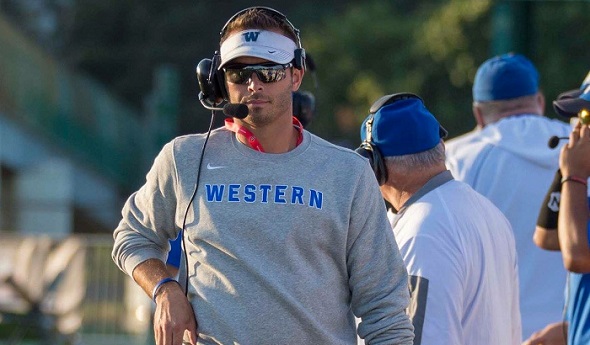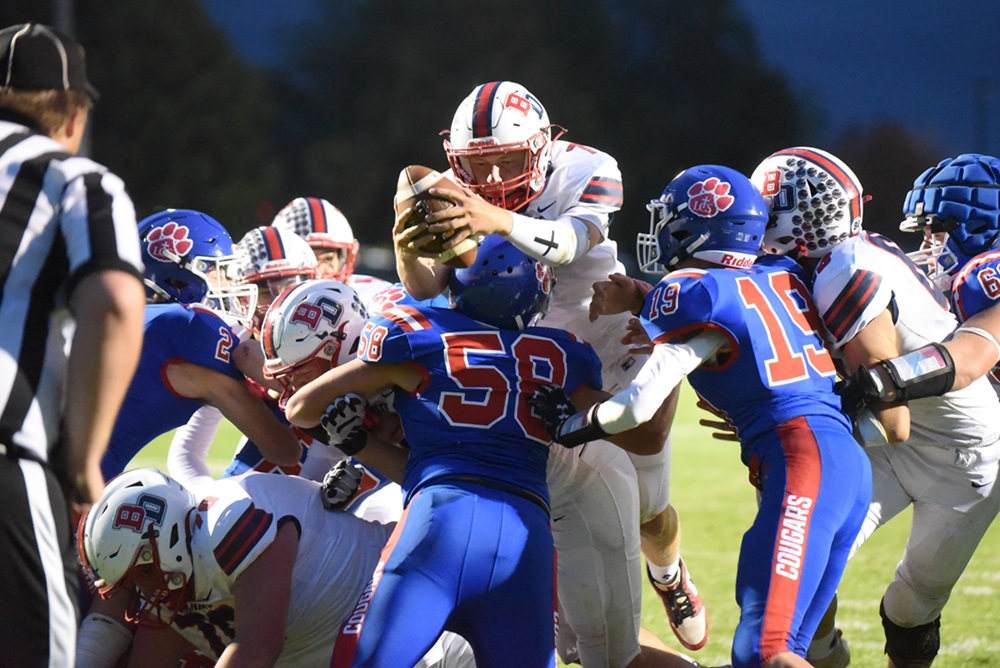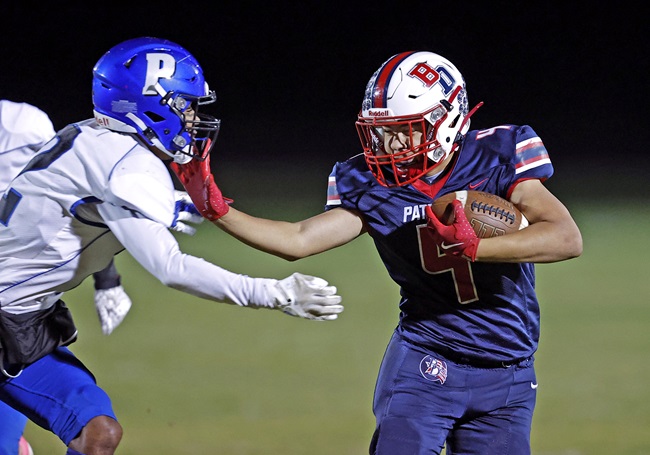
Family Coaching Tree Grows to 3 Generations
By
Tom Markowski
Special for Second Half
September 13, 2018
Like father like son, like grandson.
 The Grignon football family continued its progression in the coaching ranks this season when Alex Grignon got his shot at being a head coach. Grignon was hired in June as head coach at Walled Lake Western to replace Mike Zdebski, who resigned to take a coaching position in Arizona.
The Grignon football family continued its progression in the coaching ranks this season when Alex Grignon got his shot at being a head coach. Grignon was hired in June as head coach at Walled Lake Western to replace Mike Zdebski, who resigned to take a coaching position in Arizona.
Alex Grignon, 31, represents the third generation from a family of past and present high school head football coaches. And one can’t talk football in Wayne County communities like Dearborn and Lincoln Park without mentioning the Grignon family.
Ted Grignon was the athletic director and head football coach at Lincoln Park in the 1980s. His two sons, Ted and Jamie, played football at Dearborn Edsel Ford and then in college – Ted, a quarterback at Western Michigan University and Jamie, a safety at Grand Valley State. Jamie Grignon is in his third stint as Lincoln Park’s head coach. He was hired in 1994 and stepped aside after the 1999 season, but never left the sport as he went to Dearborn High as an assistant under Dave Mifsud in 2000. Grignon went back to Lincoln Park in 2013 as the head coach and, after taking another brief hiatus, came back last season and remains in that position.
His two sons, Andrew and Alex, played for Mifsud at Dearborn; and in 2004, Alex’s senior season, Dearborn reached a Division 2 Semifinal before losing to Orchard Lake St. Mary’s, 6-0. It marked the first time the program advanced that far in the MHSAA Playoffs.
 Andrew switched sports and played lacrosse in college (at Grand Valley), but his younger brother stuck with football. After playing four years at Northern Michigan, Alex was a graduate assistant there working with the offense before joining his father’s staff at Lincoln Park.
Andrew switched sports and played lacrosse in college (at Grand Valley), but his younger brother stuck with football. After playing four years at Northern Michigan, Alex was a graduate assistant there working with the offense before joining his father’s staff at Lincoln Park.
The Railsplitters have had their struggles of late, starting this season 0-3 and last making the playoffs in 2015. But in 2013, with Jamie as the head coach and Alex as the defensive coordinator, Lincoln Park ended a 66-game losing streak by defeating Taylor Kennedy, 34-20.
After five seasons at Lincoln Park, Alex went to South Lyon last season as the offensive coordinator, and this season he made the big jump. Walled Lake Western is one of the top programs in the Detroit area and a member of the Lakes Valley Conference, and Grignon has the Warriors off to a 2-1 start.
“He was proud that he was the third generation (of head coaches),” Jamie Grignon said. “When he coached with me, it was a growing process for him. There isn’t anyone who works harder than Alex. Whether it’s watching film, working with the kids after practice or what. He’s full-go.”
Like father like son. Jamie is not one to toot his own horn, but when he was the defensive coordinator at Dearborn people in the Downriver area, and in other football strongholds in the county, knew Mifsud had one of the best coaches calling his defense.
Mifsud is in his sixth season as the head coach at Parma Western after serving 16 in the same position at Dearborn. He was an assistant coach at Dearborn for four seasons before being named head coach in 1997.
 Remember those dates. Before Mifsud was able to hire Grignon, the two met as adversaries on the field. Lincoln Park defeated Dearborn, 14-0, during Dearborn’s homecoming, no less, in 1999. That was Grignon’s last season during his first stint at Lincoln Park.
Remember those dates. Before Mifsud was able to hire Grignon, the two met as adversaries on the field. Lincoln Park defeated Dearborn, 14-0, during Dearborn’s homecoming, no less, in 1999. That was Grignon’s last season during his first stint at Lincoln Park.
Mifsud didn’t have to twist Grignon’s arm to join his staff at Dearborn. Grignon’s oldest son, Andrew, was set to play for Mifsud in 2000. Alex is two years younger, so Mifsud was secure knowing the Grignons had his back.
“I was in my fourth year when Andrew came through, I hired Jamie and Keith Christnagel, who’s the coach at Woodhaven now,” Mifsud said. “We grew up together, the three of us, as coaches. We racked our brains learning the ropes. I always coached the offense. Keith had the offensive and defensive lines and Jamie the defense. The working relationship with Jamie was excellent. We split up the special teams, though he probably did more there.
“People know of Jamie, and he worked his tail off. On Sundays I’d stop by, you know, just to drop some film off or just to touch base, and his entire dining room would be spread all around with notes on breaking down the other team’s offense and such. Jamie’s a high-energy guy. He’s always thinking.
“Looking at Alex, yeah, I think they are similar. They can’t sit still. They’re always looking for something better. What a great hire (for Walled Lake Western). Alex is so great with the kids. He’s young (31). He’s got great football intelligence. Jamie was like that. He would tweak things in practice. He’d never be satisfied. Alex has that. He’s Jamie but at a different level.”
Mifsud and Jamie Grignon both said that what makes Alex a cut above is his leadership. As good as Alex was athletically as a player, his father said it was his leadership qualities that set him apart.
 Mifsud recalled a story, a 2-3 week period, actually, during the 2004 season. The staff had yet to elect captains, and as preseason practices wore on Mifsud and his staff were taken aback by the actions of three seniors, Alex among them.
Mifsud recalled a story, a 2-3 week period, actually, during the 2004 season. The staff had yet to elect captains, and as preseason practices wore on Mifsud and his staff were taken aback by the actions of three seniors, Alex among them.
The coaches didn’t have to blow a whistle to start practice. Those three would have the players ready.
“I looked at my coaches,” Mifsud said. “And said those are our captains.”
Alex said he never thought about being a leader. It just came naturally. He grew up watching football from the sidelines, and later as a water boy, and then at home watching his father gather notes and dissect film footage.
“I was on the sidelines my entire life,” he said. “The leadership, you see it. You watch the players. You know what it takes to be a leader. I tell my players at Western, people want to be led.
“As a youth you don’t realize what level dad is coaching at, but you remember going to coffee shops exchanging film. I’d have my ninja toys with me, and the next minute I’d be holding dummies. Dad didn’t push us. He wanted us to do what we wanted to do. Heck, I was a big-time soccer player. I didn’t start playing football until middle school. For two years I did both.”
By his freshman year, Alex was all in for football. His was one of best classes the school has had for the sport, and Alex recalls that 40-50 of his classmates showed their dedication by increasing their work in the weight room.
Playing with his brother for two years and with his father for all four only made Alex more determined.
“I can’t talk football and family without getting emotional about it,” he said. “Watching your dad work 18 hours on the weekend, turning the pages of his legal pad, he was always doing something. I remember eating eggs for breakfast every day and peanut butter sandwiches for lunch to try and get as much protein in our bodies. I’d get up as a child, and he’d be on his third cup of coffee. He never stopped. He saw us wanting to be around the game, and he helped in any way he could to make us better.
“Everything I know, I’ve seen him do.”
 Tom Markowski is a columnist and directs website coverage for the State Champs! Sports Network. He previously covered primarily high school sports for the The Detroit News from 1984-2014, focusing on the Detroit area and contributing to statewide coverage of football and basketball. Contact him at [email protected] with story ideas for Oakland, Macomb and Wayne counties.
Tom Markowski is a columnist and directs website coverage for the State Champs! Sports Network. He previously covered primarily high school sports for the The Detroit News from 1984-2014, focusing on the Detroit area and contributing to statewide coverage of football and basketball. Contact him at [email protected] with story ideas for Oakland, Macomb and Wayne counties.
PHOTOS: (Top) Walled Lake Western coach Alex Grignon is in his first season as head coach at Walled Lake Western. (Top middle) Alex, left, and father Jamie Grignon when Alex was assisting Jamie at Lincoln Park. (Middle) Current Parma Western and former longtime Dearborn coach Dave Mifsud. (Below) Alex and Jamie Grignon, when both were coaching Lincoln Park, and Alex with his family now as coach at Walled Lake Western. (Photos courtesy of Grignon family; Walled Lake Western photos by Teresa Presty Photography.)

Seeing is Believing as Confident Britton Deerfield Playing for Finals Trip
By
Doug Donnelly
Special for MHSAA.com
November 12, 2024
A little confidence can go a long way. A lot of confidence could get you to the state championship game.
 Britton Deerfield is enjoying a remarkable turnaround season this year and will host Morrice for an 8-Player Division 2 Semifinal on Saturday.
Britton Deerfield is enjoying a remarkable turnaround season this year and will host Morrice for an 8-Player Division 2 Semifinal on Saturday.
Last year at this time, head coach Erik Johnson was shaking off the pain of a 2-7 season.
“It’s a great story,” Johnson said. “You go 2-7 and, really, last year, the last five weeks of the year we weren’t even in the game. We were getting blown out by halftime in most of those games.
“For those kids to have the resolve and come back and have the kind of success they are having this year is just great to see.”
Britton Deerfield is in its fourth season of 8-player football and having its best season yet. The Patriots have won nine straight games heading into Saturday’s Semifinal against Morrice and have set a school record for points scored in a season. Over the last six weeks, they are averaging 60.3 points per game and set the school’s single-game scoring record.
Senior Luke Wiser said the difference from last season is the team’s confidence.
“It’s all in the mindset,” Wiser said. “Last year we didn’t have the great confidence we have now.”
BD struggled early this season until that confidence kicked in. The Patriots defeated Pittsford in Week 1 but gave up 58 points. They lost in Week 2 to Mendon, giving up 66 points.
Johnson went to the defensive drawing board and challenged his players to get better.
“We talked a lot about the mental aspect of tackling,” he said. “They’ve been tackling since middle school. They’ve been through every tackling drill you can do. Now, it’s about the mental part of football, wrapping up and making the play.”
Over the next two weeks BD held Colon and Concord to one touchdown each.
The new Patriots offense started to soar as well. Johnson had favored a spread offense with a lot of jet sweeps and the quarterback alternating running and throwing the ball. In the offseason, he made a change.
“I knew we were going to have a stable of kids who could run the ball and a couple of different kids who could throw the ball, so I started to think of how I could maximize their efforts,” he said. “We went to more of a single wing offense. I watched a video series about the single wing and worked on ways to adjust that to make it work for our 8-man game.”
The single wing look requires the center to snap the ball to one of three backs and none playing the traditional role of quarterback. The results have been great.
The Patriots have rushed for 68 touchdowns this season and average 7.9 yards a carry. Wiser has rushed for 1,549 yards and scored 27 touchdowns. Caden Freeman has rushed for 806 yards, Caden Kubacki 666 and Cayden Allshouse 569.
 Wiser credits the BD offensive line.
Wiser credits the BD offensive line.
“It’s almost like I’m not running,” he said. “I follow my blocks and break off a run, but I think they really do an outstanding job, and our offense moves through them.”
Johnson said as the linemen settled in this season, they started to come to him to suggest different things.
“You know things are going well when the kids see something on the field and come talk to the coaches about it,” he said. “I’ll just say, ‘Yeah, let’s give that a try.’”
On defense, seniors Hunter Kniffin and Jayden Brooks lead the Patriots in tackles. Junior Liem Roe has eight interceptions.
In the first round of the playoffs, BD knocked out Adrian Lenawee Christian, which had won three Finals championships over the last four years. That, in itself, turned some heads.
“To beat LCS was huge for our confidence,” Johnson said. “We have been able to beat some teams that have had our number. LCS had handled us in every game we have had with them until this year.”
BD has eight seniors who have stepped into leadership roles. Juniors who played a lot as sophomores are contributing too.
“We had some younger guys in the backfield last year, but those guys have all grown up,” Johnson said. “The seniors have done an outstanding job of being there, ever since summer. When all of your seniors are there, that feeds down through the program. Other kids see that.”
Johnson said four years ago he couldn’t have predicted the current group of seniors would be where they are today.
“Some of those kids didn’t even play when they were a freshman,” he recalled. “It’s been a pleasant surprise to watch that group mature, and to see them now have success is awesome.”
The Patriots captured the first Regional championship for the program since Britton and Deerfield combined to form one high school in 2010.
From 1993 to 2010, the two schools played a cooperative football program and reached the 11-Player Semifinals in 1999 and 2000. A photo hangs in the school showing a huge crowd ringing the field during the playoff runs those seasons.
The team plays in a new stadium, just a few hundred yards from the old stadium, which is now the practice field.
“The crowd was great,” Johnson said of the Regional championship win over Pittsford. “They were into it. They stayed until after the trophy presentation and celebrated. It was great.”
If Britton Deerfield wants to get to the Division 2 championship game Nov. 23 in Marquette, the Patriots will need that crowd and confidence when they face the 10-1 Orioles this weekend.
“Our kids are really confident,” Johnson said. “That’s a good thing. You get that feeling like you can’t be stopped, and you can win every game you play. That’s good to have.”
 Doug Donnelly has served as a sports and news reporter and city editor over 25 years, writing for the Daily Chief-Union in Upper Sandusky, Ohio from 1992-1995, the Monroe Evening News from 1995-2012 and the Adrian Daily Telegram since 2013. He's also written a book on high school basketball in Monroe County and compiles record books for various schools in southeast Michigan. E-mail him at [email protected] with story ideas for Jackson, Washtenaw, Hillsdale, Lenawee and Monroe counties.
Doug Donnelly has served as a sports and news reporter and city editor over 25 years, writing for the Daily Chief-Union in Upper Sandusky, Ohio from 1992-1995, the Monroe Evening News from 1995-2012 and the Adrian Daily Telegram since 2013. He's also written a book on high school basketball in Monroe County and compiles record books for various schools in southeast Michigan. E-mail him at [email protected] with story ideas for Jackson, Washtenaw, Hillsdale, Lenawee and Monroe counties.
PHOTOS (Top) Britton Deerfield’s Caden Kubacki, with the ball, stretches forward for extra yardage against Adrian Lenawee Christian. (Middle) Luke Wiser (4) takes on a Pittsford tackler. (Top photo by Deloris Clark-Cheaney. Wiser photo by John Discher.)

